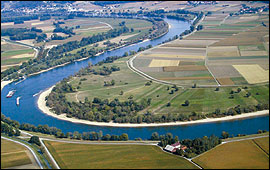German waterway development to respect WFD |
 |
Plans for extending the
existing navigability of
the Danube threatens
some still intact
river sections, as here in
Bavaria, and challenge
the credibility of the
EU Water Framework |
Recent negotiation of a new German federal government was closely
followed by Danube observers for its stance on river development. Their
interest follows the decade-long conflict over waterway development in the
last free-flowing section of the Bavarian Danube between Straubing and Vilshofen.
While the Bavarian government, ruled by the CSU, pushes for a dam development
of the 70 km stretch, the German Bundestag decided in June 2003 via its
SPD-Greens government majority to limit development planning to simple river
bed improvement.
The ICPDR's Danube Analysis Report 2004 states that the upper Danube is
interrupted already by a series of dams and impoundments built to increase
navigation and energy exploitation. Only four stretches can still be called
free-flowing in the 1000 km upstream from Bratislava.
Consequently, Danube NGOs were upset to learn
that in early 2005 the Bavarian government, under
the WFD, has "provisionally" designated this river
section as heavily modifi ed. While all designations
still need to be harmonised at the EU and Danube
Basin level, the new Coalition Contract between the
government partners CDU, CSU and SPD from November
11 states that any construction and maintenance
of federal waterways has to take into account
the protection of water bodies and the conservation
of ecological functions, as stipulated in the directive.